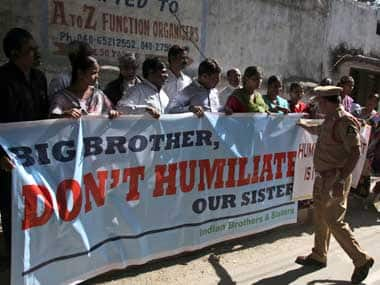By A Special Correspondent The final days of the Devyani Khobragade incident were characterised by a series of dizzying diplomatic manoeuvres on both sides. India posted Khobragade to the UN, thereby upgrading her status to full diplomatic immunity. This had to be affirmed by the US State Department, which apparently took its own time as a way of applying pressure to the Indian side. Without the upgrade there would have been the embarrassment of her having to appear in court on her earlier consular status. The approval of the State Department apparently came through at the last minute. Under the Headquarters Agreement between the United States and the United Nations, it would have been unprecedented for the US to refuse diplomatic status to a sending country’s accredited representatives at the UN. The only exception the US can do this is if it can prove that its national security would be threatened by such accreditation. Nothing like that could be remotely alleged here. [caption id=“attachment_1355229” align=“alignleft” width=“380”]  Protests in India over the Khobragade issue: AP[/caption] So the State Department acceded to the Indian request, full diplomatic immunity was granted, and the G1 visa was issued. Twists: The next twist in the story concerns the Convention on Privileges and Immunities of the United Nations of 1946. Under Article IV (14) of the Convention, privileges and immunities, even if diplomatic, are accorded not for the personal benefit of individuals themselves, but to safeguard the independent exercise of their functions in connection with the UN. Consequently a sending state, in this case India, not only has the right but is under a duty to waive the immunity of its representative in any case where - in the opinion of the state - the immunity might impede the course of justice. Presumably the US used this clause to request India to waive Khobragade’s immunity, an immunity that the US itself had been obliged to grant. The US – dealing with over 100,000 diplomatic and consular personnel on its soil – might have been wary about setting a precedent. Consular officials of other countries might have used the UN posting as a way to get away from their limited immunity. Not making the request to India to waive immunity, would have resulted in other countries insisting on the same, when their consular officials or diplomats got into trouble. Predictably enough, India as the sending state, did not waive immunity. National pride and honor is at stake. Waiving Khobragade’s immunity would have been politically unacceptable. Even at this stage, the US could have stopped at that, rather than force the diplomat’s recall. However, the issue of setting a precedent would again have raised itself. The US could then have opted to declare Khobragade persona non grata, forcing her recall. Presumably instead of that, on mutual agreement, a request was made to India to withdraw the diplomat, a request to which India acceded, resulting in her recall, and subsequent reassignment in the ministry of external affairs (MEA). An unusual twist here is the attempt of the parties to plea bargain their way out of the situation. The vast majority of US judicial cases are actually plea bargained out of court. This is a culture that the Indian side is not used to at all. Apparently Khobragade herself was inclined towards a plea bargain, as it would have allowed her access to the US afterwards in a capacity other than official. Her bosses at the MEA apparently thought otherwise, wary about the admission of guilt that it might imply. And so the matter rests. Or does it? Questions and the way forward: Now a series of questions arises. Some of them are awkwardly personal. Preet Bharara, the US attorney, in his submission to the court says that the charges against Khobragade are to remain until either there is a waiver of immunity, or she returns to the US in a non-immune status. Both, presumably, will never take place. The Indian government, already given the chance to waive her immunity, has declined to do so. Her return in a non-immune status is out of the question. Till the IFS retirement age, there will be the option of returning with immune status. That interesting question has been left out of Bharara’s submission to the courts. Presumably the Indian government can repost her to its embassy, or the UN. Returning with immune status is itself subject to the US agreeing to the same and credentialling her. The State Department will then be in the awkward position of credentialling a foreign diplomat who has criminal proceedings against her in the American judicial system. Presumably neither side will want the awkwardness and embarrassment to start again. There may be human collateral damage to all this. Khobragade’s children are born of an American father, and are presumably US citizens. They face the prospect of being citizens of a country that will prosecute their mother on entry into it. This is tough. One option – the romantic Hindi movie option - is for her to resign for the IFS, obtain US citizenship through her husband, and return to the US to plea bargain her way out of the mess. There will be more tangles, but they will be her personal issues. How does, for example, an Indian national on a consular status, who subsequently got upgraded to diplomatic status who faces a criminal charge when she had consular status, get treated when she subsequently becomes a US citizen. Try solving that one! [caption id=“attachment_1355235” align=“alignleft” width=“380”]  Devyani in India: PTI[/caption] With a good lawyer she maybe able to get off with three months of community service, or something like that. Of course, doing so might mean losing the power and backing of the Indian government. But then your correspondent is a hopeless romantic. Precedents: Strangely enough, there are precedents on both sides for something like this that has happened without the resultant public uproar. On the US side, there is the case of Yoshiyaki Nagaya, the Japanese vice consul in San Francisco, holding a position identical to Khobragade. He was arrested on charges of spousal battery. The contrast between the Indian and the Japanese government’s response is striking. In Nagaya’s case, due to limited immunity and the fact that the offence was not related to Nagaya’s consular functions, the Japanese government actually declined to provide legal support to its own consul, insisting he pay his own legal fees. He was subsequently convicted, and is spending a year in jail. On the Indian side, there is the situation of Pascal Mazurier, a French consular official in Bangalore - also of near identical status to Khobragade - who is facing criminal charges of child molestation against his own daughter. In this case, after the Home Ministry and the MEA confirmed Mazurier’s consular status, he was arrested and charged. Media reports indicate that he was also treated in a way quite similar to Khobragade in New York. The case is ongoing. Again, no hullabaloo in France over this, just quiet workmanlike diplomacy. Time, the healer, may come to the rescue in all this. Attention can then turn to the Indo US relationship. Increasingly, India and the US appear to be two nations separated by a common language and common political systems. But things will change and national interests will reassert themselves. Presumably over time, attention will move to the stalled civil nuclear cooperation deal, defence purchases, visa and social security tax issues pertaining to employees of India’s vast IT industry posted to the US, education, and the complexities of managing a $100 billion trade relationship - a trade relationship with one of the few countries in the world with whom India runs a trade surplus, rather than a deficit.
Less than two weeks after India and the US ended their standoff over the Khobragade affair, here’s an assessment of how things got handled.
Advertisement
End of Article
Written by FP Archives
see more


)

)
)
)
)
)
)
)
)



